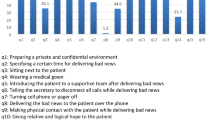Abstract
Background. The breaking of bad news is a frequent and well recognized task that is performed by a variety of health professionals including medical doctors. In this article, we explore both how this topic is dealt with in medical education in Iran and also consider how this aspect of the curriculum might be enriched in the future. Methods. This article is based on research, which was undertaken using a purposively selected sample of medical course planners in Iran. Semistructured interviews were conducted with each of 10 carefully selected participants. Their interview responses were analyzed in such a way as to provide an in-depth exploration and interpretation of both their perceptions and experiences in relation to this sensitive and highly important topic. Results. Four major themes emerged from the analysis of the interview transcripts: medical paternalism, religion, training issues, and professional barriers. Conclusions. On the basis of this analysis, there appears to be an urgent need for integrating more emphasis on techniques for breaking bad news into the Iranian medical education curriculum. This curriculum could in the future place more emphasis on addressing specific religious issues, which are unique to the local culture. A number of other specific recommendations are formulated and discussed.
Similar content being viewed by others
References
Fallowfield L, Lipkin M, Hall A. Teaching senior oncologists communication skills: results from phase I of a comprehensive longitudinal program in the United Kingdom. J Clin Oncol. 1998;16:1961–1968.
Mueller PS. Breaking bad news to patients. The SPIKES approach can make this difficult task easier. Postgrad Med. 2002;112:15–16, 18.
Back A, Curtis J. Communicating bad news. West J Med [serial online]. 2002;17:177–180.
Baile WF, Buckman R, Lenzi R, Glober G, Beale EA, Kudelka AP. SPIKES-A six-step protocol for delivering bad news: application to the patient with cancer. Oncologist. 2000;5(4):302–11.
Rosenbaum ME, Ferguson KJ, Lobas JG. Teaching medical students and residents skills for delivering bad news: a review of strategies. Acad Med. 2004;79:107–117.
Ptacek JT, Eberhardt TL. Breaking bad news. A review of the literature. JAMA. 1996;276:496–502.
Fallowfield L, Jenkins V. Communicating sad, bad, and difficult news in medicine. Lancet. 2004;363:312–319.
Dosanjh S, Barnes J, Bhandari M. Barriers to breaking bad news among medical and surgical residents. Med Educ. 2001;35:197–205.
Murphy E, Dingwall, R. Qualitative Methods and Health Policy Research. New York: Aldine De Gruyter; 2003.
Faulkner RA, Klock K, Gale JE. Qualitative research in family therapy: publication trends from 1980 to 1999. J Marital Fam Ther. 2002;28:69–74.
Polit DF, Beck CT. Nursing Research: Principles and Methods. 7th ed. Philadelphia, PA: JB Lippincott Williams & Wilkins; 2004.
Editorial. First, the bad news. CMAJ.2004;17:1.
Dubé CE, LaMonica A, Boyle W, Fuller B, Burkholder GJ. Self-assessment of communication skills preparedness: adult versus pediatric skills. Ambul Pediatr. 2003;3:137–141.
Eggly S, Afonso N, Rojas G, Baker M, Cardozo L, Robertson RS. An assessment of residents’ competence in the delivery of bad news to patients. Acad Med. 1997;72:397–399.
Rappaport W, Witzke D. Education about death and dying during the clinical years of medical Schools. Surgery. 1993;113:163–165.
Fallowfield L, Jenkins V, Farewell V, Saul J, Duffy A, Eves R. Efficacy of a cancer research UK communication skills training model for oncologists: a randomized controlled trial. Lancet. 2002;359:650–656.
Parle M, Maguire P, Heaven CM. The development of a training module to improve health professionals’ skills, self-efficacy and outcome expectancies when communicating with cancer patients. Social Sci Med. 1997;44:231–240.
Author information
Authors and Affiliations
Corresponding author
Rights and permissions
About this article
Cite this article
Tavakol, M., Murphy, R. & Torabi, S. Educating doctors about breaking bad news: An Iranian perspective. J Canc Educ 23, 260–263 (2008). https://doi.org/10.1080/08858190802235379
Issue Date:
DOI: https://doi.org/10.1080/08858190802235379




